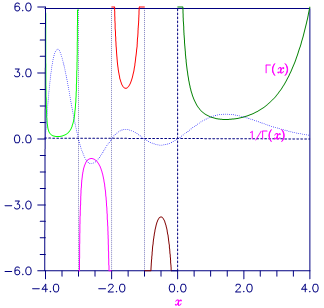gamma
Evaluates the real gamma function Γ(x).
Synopsis
#include <imsl.h>
float imsl_f_gamma (float x)
The type double function is imsl_d_gamma.
Required Arguments
float x (Input)
Point at which the gamma function is to be evaluated.
Return Value
The value of the gamma function Γ(x).
Description
The gamma function, Γ(x), is defined to be
For x < 0, the above definition is extended by analytic continuation.
The gamma function is not defined for integers less than or equal to zero. It underflows for x << 0 and overflows for large x. It also overflows for values near negative integers.

Figure 1, Plot of Plot of Γ(x) and 1/Γ(x)
Example
In this example, Γ(1.5) is computed and printed.
#include <stdio.h>
#include <imsl.h>
int main()
{
float x = 1.5;
float ans;
ans = imsl_f_gamma(x);
printf("Gamma(%f) = %f\n", x, ans);
}
Output
Gamma(1.500000) = 0.886227
Alert Errors
|
IMSL_SMALL_ARG_UNDERFLOW |
The argument x must be large enough that Γ(x) does not underflow. The underflow limit occurs first for arguments close to large negative half integers. Even though other arguments away from these half integers may yield machine-representable values of Γ(x), such arguments are considered illegal. Users who need such values should use the logΓ(x) function imsl_f_log_gamma. |
Warning Errors
|
IMSL_NEAR_NEG_INT_WARN |
The result is accurate to less than one-half precision because x is too close to a negative integer. |
Fatal Errors
|
IMSL_ZERO_ARG_OVERFLOW |
The argument for the gamma function is too close to zero. |
|
IMSL_NEAR_NEG_INT_FATAL |
The argument for the function is too close to a negative integer. |
|
IMSL_LARGE_ARG_OVERFLOW |
The function overflows because x is too large. |
|
IMSL_CANNOT_FIND_XMIN |
The algorithm used to find xmin failed. This error should never occur. |
|
IMSL_CANNOT_FIND_XMAX |
The algorithm used to find xmax failed. This error should never occur. |






